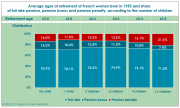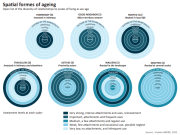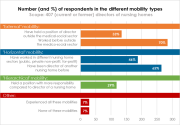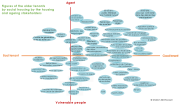
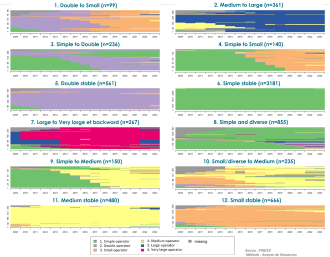
Federico BIETTI, a sociologist, is interested in the dynamics of the liberalisation of EHPAD provision, following the reforms initiated with the creation of the Regional health agencies (ARS) in 2009. He examines the phenomenon of the concentration of EHPAD management on larger operators (expansion and consolidation of operators).
The administrative data provides the public, non-profit and private operators of the 7231 EHPADs registered between 2009 and 2023. Federico BIETTI classifies them into 6 categories according to whether they manage one establishment (Single), two (Double) or more: 3 to 6 establishments (Small operators), 7 to 20 (Medium), 21 to 100 (Large), more than 100 (Very large). A sequence analysis identifies 12 trajectories of management over the period.
For 68% of EHPADs, the size of the operator is stable: Half are Single (n=3181) or Double (n=561). For 17%, the size of the operator increased: from Simple to Double, Small or Medium (n=526); from Double to Small (n=99); from Medium to Large (n=361). The trajectories from Large to Very Large operators mainly took place in 2010, then in 2014 (consolidation of operators) (n = 267): management is stable for the first wave, but for the second, a number of establishments return to a smaller operator after 2021 (group disposal). The remaining EHPADs (15%) are managed by a mix of Single, Double and Medium operators.
The concentration dynamic is clearly present between 2010 and 2019. However, Federico BIETTI shows that these trajectories stabilise after 2019. In some cases, they are reversing, which he links to the Covid-19 crisis and the uncovering of failures, and even abuse, particularly in some EHPADs of very large groups.
All in by far the majority of establishments are, and remain, run by small operators, particularly public-sector ones.
Statut :
Docteur en sociologie
Affiliations :
Ined, projet AURELIA, Régimes d’autonomie dans le soin de longue durée : instrumentation et territoires. Lauréat du Programme Prioritaire de Recherche (PPR) Autonomie.
